The collapse of the globalist neoliberal system, the steady decline of its political representatives, their defeat in the European Parliament elections, and President Macron’s dissolution of the National Assembly have plunged the country into a deep crisis.
The collapse of the globalist neoliberal system, the steady decline of its political representatives, their defeat in the European Parliament elections, and President Macron’s dissolution of the National Assembly have plunged the country into a deep crisis.
By Ali Rıza Taşdelen
Over the past five years, France has seen no major mass movements or widespread protests in response to social and economic crises. The last significant wave of popular mobilization was the Yellow Vests movement, which began in October 2018 and peaked in 2019 with mass demonstrations against pension reform. The COVID-19 pandemic in 2020–2021, followed by the war in Ukraine starting in February 2022, seemed to numb French society and started a period of silence.
Today, the conditions that drove the Yellow Vests into the streets in 2018 have only worsened: The production losses caused by the pandemic, the ongoing war in Ukraine, sanctions imposed on Russia and the resulting energy crisis, rising inflation, deindustrialization, unemployment, and deepening poverty
The collapse of the globalist neoliberal system, the steady decline of its political representatives, their defeat in the European Parliament elections, and President Macron’s dissolution of the National Assembly, and that no party or alliance secured a governing majority, have plunged the country into a deep political crisis, on top of its economic and social turmoil.
Added to all this is Donald Trump’s second term. Trump, seeking a deal with Putin, is working to end the war in Ukraine by sidelining Europe. The political divide between “globalists” and “patriots” is now surfacing both in the US and Europe. This is now also reflected in the growing polarization between pro-war and anti-war camps. The pro-war globalists are fanning the flames of confrontation with Russia and calling for rapid rearmament.
This climate of anti-Russian stance, warmongering, and reckless militarization are candidate to strike a heavy blow on already struggling European economies. To make this agenda possible, cuts to public services particularly in healthcare, education, and social protections will likely follow.
A recent survey conducted by IFOP and Agir Ensemble and published on March 26 in Le Figaro highlights growing fears around national disintegration, income inequality, rising Islamophobia, abandonment of Europe by the US, and the risk of civil war.
Social explosions on the horizon
In the survey, Le Figaro reminds readers that “the dissolution of the National Assembly and the resulting political stalemate, set against the backdrop of the wars in Ukraine and Gaza, had already triggered public concern over national security, economic instability, and deepening divisions across Europe”. However, the newspaper underscores that in this latest survey, such fears have reached unprecedented levels. Eight out of ten French believe there is a real risk of social explosion in the coming months. This is a “record”.
Respondents, unprompted, indicated that this explosion could take various forms: a new farmers’ movement, uprisings in working-class suburbs (similar to past banlieue riots), or a “second wave” of the Yellow Vests movement.
Fear of civil war
Some participants in the survey envision a scenario that is even more chaotic. An astonishing 42% of respondents foresee the possibility of civil war —a scenario previously unthinkable in modern France. The Ifop institute notes that attacks on institutions such as the Élysée Palace or the National Assembly (mentioned by 39%) are now seen as plausible events, drawing comparisons to the storming of the U.S. Capitol in 2021.
Distrust in institutions has reached a historic high: 60% of respondents express doubt in the ability of political leaders to maintain stability, a level of mistrust perhaps unmatched since the birth of the Fifth Republic.
Muslims as scapegoats
When asked about the root causes of the fragmentation within French society, many respondents blamed foreigners, particularly Muslims. Prejudices such as the belief that migrant children are more prone to criminal behavior were widespread. High percentages cited the rise in criminality (88%), population density (88%), and the concentration of specific ethnic groups in certain neighborhoods (82%) as major contributors to social breakdown.
Income inequality was also cited but ranked behind immigration-related concerns (77%). Following that was the idea that public spaces are increasingly dominated by religious extremism (75%).
The survey also revealed perceptions of various religions and their association with radicalism. Islam was viewed as radical by 63%, compared to 23% for Judaism and 16% for Catholicism. However, the results show that public opinion draws a clear distinction between “moderate” Islam and Islamism. Practices such as praying five times a day or abstaining from alcohol are generally seen as markers of moderate faith. Whereas forcing children to fast during Ramadan, veiling young girls, or refusing to shake hands with the opposite sex are viewed as signs of radicalization.
A large majority of respondents expressed concern about the spread of Islamist ideology in French society, particularly in working-class neighborhoods (72%), prisons (70%), schools (63%), universities (56%), and even sports clubs (52%). According to Ifop, while 84% of the French public reject Islamism, a notable 30% of those under 25 view it positively.
Driss Ghali, author of “A Counter-History of French Colonialism”, argues that “the French Republic is slowly breaking down and eroding due to social transformations that threaten its very foundations.” He points to the suburbs (banlieues) evolving into “mini towns” with their own codes, cultures, and languages, often alienated from French republican values. “In general,” he writes, “they are in conflict with France and the Republic. Police are seen not as protectors but as repressive agents.”
Russia and Iran seen as the “biggest threats”
Le Figaro notes that public anxiety is not confined to domestic issues. The international context, shaped by the war in Ukraine and US policies that isolate Europe, is also a source of concern. According to the survey, 84% of respondents believe France is under threats or pressure of other countries. When asked where source of this threat is, 81% identified Russia, followed by Iran (70%), and a group of Arab-Muslim countries including Syria, Afghanistan, and Algeria (62%).
Three months after Donald Trump’s return to the White House, three-quarters of French respondents believe the president will contribute to “destabilizing” the global order. Yet paradoxically, 70% also see in him the kind of leadership they would want for their own country.
On the brink of war?
On the Observateur-continental website, political analyst Germán Gorraiz Lopez posed a stark question in his article “Is NATO About to Declare War on Russia?” He warns of a growing collective psychosis: “People are starting to believe that war in Europe is imminent, and they are stocking up on survival kits.”
Lopez suggests this is not just a panic-induced reaction, but part of a broader campaign of psychological manipulation. “What lies behind this campaign?” he asks: “Are we on the verge of a militarized public life, martial law, and a war economy that slashes social spending? Rumors of renewed lockdowns, curfews, and even the suspension of passports to prevent citizens from fleeing the country are revolving.
Lopez predicts that European elites, led by Macron, Starmer, Merz, and von der Leyen, are preparing for a low-intensity nuclear conflict against Russia, potentially involving “non-strategic” or “tactical” nuclear weapons, as classified by the Nuclear Threat Initiative (NTI). Drawing attention to the current balance of nuclear warheads between Russia and NATO, he notes: “Russia is believed to possess approximately 1,800 nuclear warheads, while NATO has around 250 warheads stationed in Europe.”
He warns that such a scenario, a limited nuclear exchange on European soil, could escalate into a widespread nuclear firestorm with catastrophic consequences for humanity, comparable to the Black Death of the Middle Ages.
Media, Fear, and the Manufacturing of Consent
President Macron’s spread of fear regarding Russia has played a significant role in shaping the anxious public mood revealed in the recent survey. But also, the influence of pro-Atlanticist media and arms industry are the shareholders in this.
Indeed, Le Figaro is owned by Dassault Aviation, the manufacturer of Rafale fighter jets.









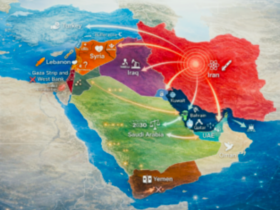
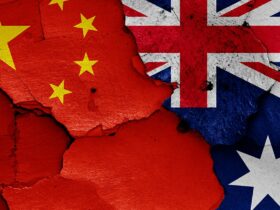

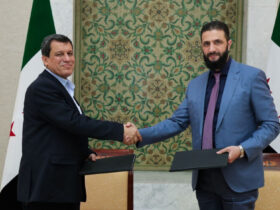
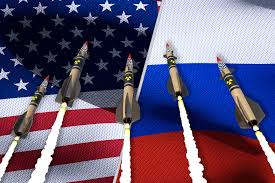
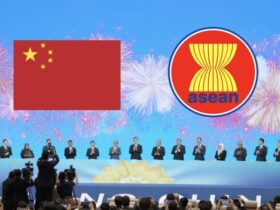
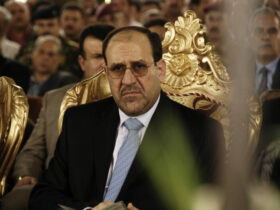

Leave a Reply